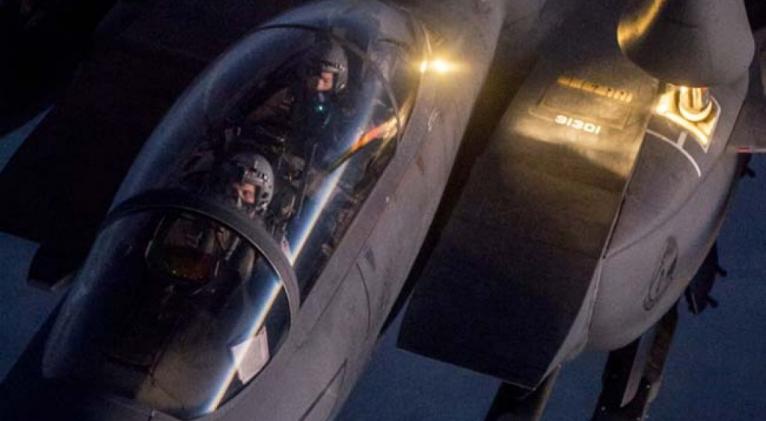US-Led Airstrikes Hit 4 Syrian Provinces
especiales

Washington and its Arab allies opened their air assault against the extremist group last week, going after its military facilities, training camps, heavy weapons and oil installations. The campaign expands upon the airstrikes the United States has been conducting against the militants in Iraq since early August.
The Britain-based Syrian Observatory for Human Rights said coalition forces hit Islamic State group facilities overnight in Aleppo, Raqqa, Hassakeh and Deir el-Zour provinces. It said there were casualties, including civilians, but that it did not have concrete figures.
One of the strikes hit a grain silo in the extremist-held town of Manbij in Aleppo province, setting it ablaze, the Observatory and the Aleppo Media Center activist group said. Another activist collective, the Local Coordination Committees, also reported what it said were coalition air raids on Manbij.
Observatory director Rami Abdurrahman said the strike on the grain silo killed civilians, but he didn't have an exact figure.
"They killed only civilians there, workers at the site. There was no ISIS inside," he said, using an alternative name for the Islamic State group. The airstrikes "destroyed the food that was stored there."
There was no immediate comment or confirmation of the strikes from the US or its allies.
In Deir el-Zour province, a strike overnight attributed to the coalition hit the entrance to the Conoco gas plan, Syria's largest, according to the Observatory. It said the gas facility itself was not damaged.
More raids Monday morning struck the town of Tel Abyad on the Syria-Turkey border, according to a resident on the Turkish side on the frontier.
Mehmet Ozer told The Associated Press by telephone that the raids hit an abandoned military base and an empty school, sending pillars of smoke and dust into the air. He said Islamic State fighters cleared out of the military about three or four months ago.
"They (the coalition) must not have fresh intelligence," Ozer said.
The Islamic State group has seized control of a huge chunk of Syria and neighboring Iraq, and has declared the establishment of a self-styled caliphate ruled by its strict interpretation of Shariah law there. Its brutal tactics, which include mass killings and beheadings, have helped galvanize the international community to go after the militants.
The US-led campaign aims to roll back the extremists' gains in Syria and Iraq, and ultimately to destroy the group.
The coalition includes Saudi Arabia, Bahrain, the United Arab Emirates, Qatar and Jordan. Several European countries also are contributing to US efforts to strike the Islamic State group in Iraq, including France, the Netherlands, Denmark, Belgium and Britain.
Despite the international efforts, Islamic State fighters have pressed ahead with their offensive against Syria's Kurds in the city of Ayn Arab, also known as Kobani, on the Turkish border.
Ismet Sheikh Hassan, a senior official in the Kobani region for the Kurdish militia, said the extremists fired rockets and tank shells at the city from the southeast, while some 1,000 militants amassed to the west. He said a 50-year-old woman was killed by the shelling.
More than 100,000 people have fled across the border to Turkey to escape the onslaught, while the US-led coalition on Saturday targeted the attacking Islamic State fighters for the first time to try to stem their advance.
The purported civilian casualties in Manbij would add to the 19 civilians that the Observatory says have already been killed in the coalition airstrikes against the Islamic State group.
On Sunday, Human Rights Watch said that it had confirmed the deaths of at least seven civilians - two women and five children - from apparent US missile strikes on Sept. 23 in the village of Kafr Derian in Idlib province. The New York-based group said two men were also killed in the strikes, but that they may have been militants.
It based its conclusions on conversations with three local residents.
"The United States and its allies in Syria should be taking all feasible precautions to avoid harming civilians," said Nadim Houry, deputy Middle East director at Human Rights Watch. "The US government should investigate possible unlawful strikes that killed civilians, publicly report on them, and commit to appropriate redress measures in case of wrongdoing."













Add new comment